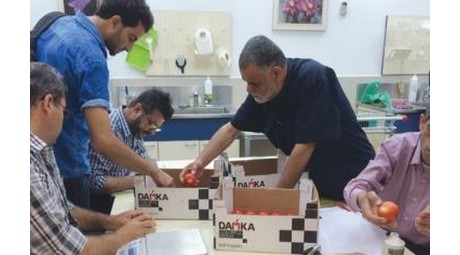 tuous conditions in southern Israeli that have been preventing many farmers from harvesting vegetables in time, over-ripened crops may need to be sold to the Palestinian vegetable market in the West Bank, one cooperative announced on Monday.
tuous conditions in southern Israeli that have been preventing many farmers from harvesting vegetables in time, over-ripened crops may need to be sold to the Palestinian vegetable market in the West Bank, one cooperative announced on Monday.Farmers from the Ein Yahav-based Yofi Shel Yerakot (Beauty of Vegetables) Cooperative said they and their coworkers in the region are facing difficulties harvesting their crops in a timely manner, due to the firing of rockets, road closures and warnings against infiltrations in the area. Tomatoes in particular, which have had to remain on their vines and are experiencing excessive reddening no longer meet the standards of the Israeli market, the farmers added.
Yisrael Cachlon, one of the farmers in the Beauty of Vegetables Cooperative, stressed that he and his colleagues are “racing against the clock picking tomatoes” despite the difficulties. However, due to the delays in harvest times and the consequent failure to meet Israeli standards, the farmers have found that they will likely need to direct their produce to the Palestinian vegetable industry in Hebron, he explained.
Daniel Lev, the executive director of the Beauty of Vegetables, stressed that despite the difficulties, farmers and their logistics coordinators are making a continued effort to prevent a shortage of vegetables and fruits to the Israeli market. Unlike other industries that can technically pause during a conflict situation, the agriculture industry must maintain its commitment to consumers, he explained.
“If farmers allowed themselves to be absent from work, a severe shortage of vegetables would be created,” Lev said.
Because the Beauty of Vegetables association is committed to providing chains and wholesalers with whom they work with high-quality, long shelf-life produce, however, there may be no choice but to transfer the crops to the neighbouring market.
“If vegetables do not meet the required standard, we will find another solution in industry or in the Palestinian market, in order for the farmers to receive at least part of their investments in vegetable growth,” Lev said.





